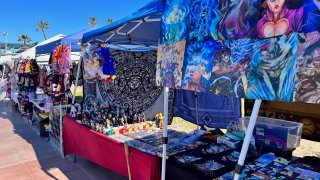
The San Francisco Board of Supervisors passed legislation on Tuesday backed by Mayor London Breed regarding a regulatory framework for street vending in the city.
The mayor says that the goal of the legislation is to disincentivize the resale of stolen goods and to support "legitimate" street vending.
Policies in the new law will specify a time, location and other parameters by which street vendors must operate. Failure to comply will result in fines and possible confiscation of goods, a spokesperson for the mayor's office said. Cited violations will not, however, result in criminal charges.
The Department of Public Works will work with community-based outreach teams to inspect and enforce vending enforcement, requiring proof of ownership of goods for sale or an authorization to sell said goods.
The legislation does not apply to food vendors or artists selling their work, both of which are already regulated, the mayor's office said.
Further, U.N. Plaza will be a vendor-free area except for Wednesdays and Sundays when the Heart of the City Farmers Market takes place.
Backers of the legislation say that a saturation of street vending activity in various locations has impeded the ability of pedestrians, specifically people with disabilities, to use public spaces safely.
Local
"Illegal street vending has also presented significant challenges for small businesses, including the increased inability to successfully serve customers coming in and out of the store due to a lack of physical space and illegal competition from the stolen goods being undersold," the mayor's office said.
The legislation was also backed by Supervisors Ahsha Safai and Hillary Ronen.
Get a weekly recap of the latest San Francisco Bay Area housing news. Sign up for NBC Bay Area’s Housing Deconstructed newsletter.
“The streets of the Mission are in chaos and we cannot continue the status quo," said Ronen. "The sidewalks are impassable, there is trash and debris everywhere, and street vendors are often selling stolen goods at half the price of the brick and mortar stores. Immigrant owned small businesses that barely survived the pandemic have called me pleading for help. We must disrupt the status quo and this legislation strikes the right balance by restoring order on the streets while simultaneously allowing opportunities for street vendors to sell products, with a permit, in a more orderly way."



